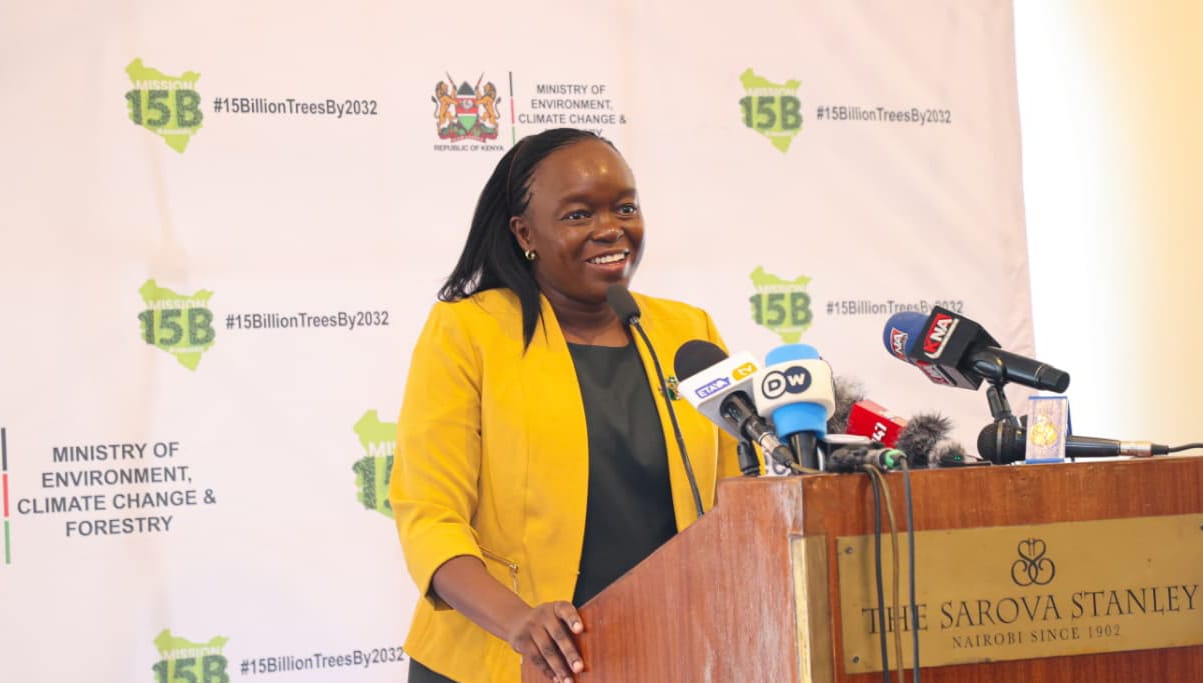
Mazingira Day: What you need to know
Mazingira Day provides a vital opportunity to accelerate environmental protection
Environment CS urged Kenyans to make tree planting a sustained practice rather than a one-day event.
In Summary

Audio By Vocalize
 Environment CS Deborah Barasa addressing the media during a briefing on the upcoming Mazingira Day celebrations at a Nairobi hotel on Wednesday, October 8, 2025. /KNA
Environment CS Deborah Barasa addressing the media during a briefing on the upcoming Mazingira Day celebrations at a Nairobi hotel on Wednesday, October 8, 2025. /KNA
Kenya is set to mark this year’s Mazingira Day with a countrywide fruit tree planting and clean-up drive aimed at deepening environmental stewardship and restoring ecosystems.
The Ministry of Environment, Climate Change and Forestry has called on citizens to plant fruit trees and clean their surroundings on October 10, as part of the 2025 celebrations themed “Citizen-Centric Tree Growing and Environmental Stewardship.”
Speaking during a media breakfast in Nairobi, Cabinet Secretary Deborah Barasa said the theme underscores the need for personal responsibility in protecting the environment and promoting sustainable livelihoods.
Barasa lauded the media for shaping Kenya’s environmental narrative and mobilizing citizens toward a cleaner, greener, and healthier nation.
She noted that Mazingira Day serves as Kenya’s national platform for environmental awareness and citizen action, advancing the government’s 15 billion Tree Growing Programme and the goal of achieving 30 per cent tree cover by 2032.
“Mazingira Day is about more than planting trees. It is about growing a culture of care, reconnecting with our roots, and giving back to our communities,” Barasa said.
“We are inviting every Kenyan to return to their former primary school to donate and plant a fruit tree, clean the school environment, and nurture a new generation of environmental champions.”
She announced that President William Ruto will lead the national event, with Cabinet and Principal Secretaries, as well as heads of public institutions, expected to plant trees and participate in clean-up exercises in their former or designated primary schools.
“For my part, I will be at Kabuyefwe Primary School in Trans Nzoia, where we will plant fruit trees and carry out a community clean-up,” CS Barasa said, adding that the initiative symbolizes leadership by example.
The CS explained that the focus on fruit trees was deliberate because of their nutritional, economic, and environmental value. “Fruit trees are life-giving.
They provide nourishment for children, income for families, and shade that cools classrooms while improving learning conditions.
They also symbolize unity and continuity because the trees we plant today will sustain generations to come,” she noted.
Each school is expected to plant at least 2,000 fruit trees, while learners will take seedlings home to expand the effort within communities.
The National Youth Service (NYS) will supply the seedlings nationwide at a subsidized cost of Sh150, with distribution points to be announced.
Cabinet and Principal Secretaries will be required to purchase and donate seedlings to their respective schools.
Since the launch of the 15 billion Tree Growing Programme, Kenya has already planted over one billion trees, marking a major milestone in environmental restoration.
Barasa also disclosed that the government is finalizing the Forest Conservation and Management Bill 2025 to strengthen laws governing forest resources and attract private investment in sustainable forestry.
She cited the launch of the Agroforestry and Bamboo Development Strategy, designed to create green jobs and link tree-based industries with community livelihoods.
She urged Kenyans to make tree planting a sustained practice rather than a one-day event.
“Let us go back to our roots, plant fruit trees, clean our schools, and grow the future we want for Kenya. By planting today, we secure tomorrow,” she rallied.
Principal Secretary for Forestry Gitonga Mugambi affirmed the ministry’s readiness, noting that technical officers from the Kenya Forest Service (KFS) and the Centre for Forestry Research (CAFRI) are available countrywide to provide professional guidance.
“We are targeting to plant at least 2,000 trees in each school, and where space is limited, students will take seedlings home. The exercise will begin this Friday, led by Cabinet Secretaries, Principal Secretaries, and heads of state agencies,” Mugambi said.
He added that Kenya has achieved significant progress, planting more than one billion trees in two years compared to 38 million under the previous administration.
“We have the infrastructure, trained personnel, and community support to accelerate progress toward the 15 billion trees target,” he said.
Secretary for Forest Development George Tarus revealed that this year’s exercise targets 100 million fruit trees in more than 57,000 schools, potentially generating over Sh3 billion in economic value within three years.
“This initiative supports ecosystem restoration, food security, and youth empowerment through job creation,” he said.
Director of Primary Education Stephen Sugut assured that the Ministry of Education is fully prepared, saying education officers and alumni have mobilized support nationwide.
“Many schools have already surpassed their targets,” he said.

Mazingira Day provides a vital opportunity to accelerate environmental protection